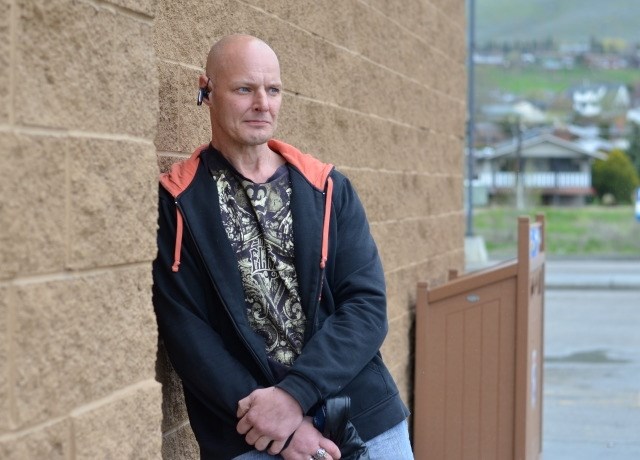
Dave Fromow, 47, has resided in Vernon since 2006.
(CHARLOTTE HELSTON / iNFOnews.ca)
April 28, 2017 - 3:17 PM
VERNON - Most days, Dave Fromow bikes from the homeless shelter to Tim Hortons where he uses the Internet to search for new rental listings.
The 46-year-old has been looking for housing since last June when he and his ex-girlfriend were evicted. He figures he’s responded to hundreds of ads over the last ten months.
“It’s frustrating because everywhere I’ve gone to there’s a line up of 20 people waiting already,” Fromow says. “They (landlords) take one look at me and automatically think I’m a drug dealer or something. Everyone else gets chosen before I do.”
Fromow is one of many people struggling to find housing in Vernon. A quick search on Kijiji, for example, shows 58 listings for houses for rent, compared to 90 wanted ads.
According to housing outreach workers, demand is far outpacing supply and that’s driving prices up beyond what those on fixed incomes — people like Fromow — can afford.
Stable, long-term housing is something Fromow has struggled with since he was just a kid. Born in Ontario, Fromow grew up in and out of different foster homes and says he’s basically been fending for himself since he was nine years old.
“My childhood was the pits,” he says. “It was hell. I was beaten up a lot. Every six months I was told I had to move. I didn’t belong anywhere. It sucked.”
He’s lived and worked across Canada, at times housed, others, on the street. He’s had some difficulty in the past with drugs, alcohol and the police, but says he’s clean now and not interested in drama or causing any trouble.
After being evicted last summer, he lived in a tent, on his own and not with others, near Vernon Jubilee Hospital with his 10-year-old dog Eva.
“I’ve had her since she was three months old,” he says. “She’s family to me.”
The dog is one reason it’s been so difficult to find a place. Most rentals are not pet-friendly, but Fromow refuses to give Eva up. It’s been hard enough not being able to see her for the past few months while he stays at the shelter and she stays at a friend’s farm.
Fromow sustained a head injury in 2005 in Calgary and hurt his hip and knee in three separate biking accidents last year in Vernon. He’s on disability and has $1,200 a month to live on. The maximum he could afford for a rental and still have enough money for food and other necessities is $800 a month.
“Just a house with a big backyard, somewhere for my dog to run,” he says when asked what he’s looking for.
He’d like to start a computer repair business and get off disability. Eventually, he’d like to reconnect with his kids, who he hasn’t seen in years. But first, he has to make sure his basic need for shelter is met.
DIRE NEED FOR HOUSING STOCK
Maggie Metz, a homeless prevention coordinator with the John Howard Society, says there is simply not enough housing in Vernon to meet the need.
“There is a very slim vacancy rate, I would almost say no vacancy rate,” she says.
According to the Canada Mortgage and Housing Corporation, the vacancy rate for rentals in Vernon was 1.9 per cent in October 2016 — down from 3.4 per cent in April 2015. The reality is the vacancy rate is likely even lower.
Income assistance rates provide $610 a month, of which $375 is designated for shelter. Many people, however, must spend the entire amount on housing and depend on food banks to get them through the month, sometimes foregoing needed medications because there’s no money left over.
According to Metz, the average price just to rent a room in a home is between $500 to $600, and bachelor suites are closer to $800. It’s an expensive and competitive market, which often leaves those on fixed incomes not only priced out, but shut out.
“Landlords can charge what they want, and they can be selective in the tenants they choose,” Metz says.
The John Howard Society runs two local shelters with a combined capacity of 69 beds. They are almost always full, leading to emergency mats funded through B.C. Housing’s Extreme Weather Response Program routinely being rolled out to meet the demand. A greater number of people have also turned to sleeping outside in recent years.
“If a shelter is brimming full over capacity where we see mats being used, or there’s an increase in people sleeping outside, that’s a good indicator that there’s not enough housing stock,” Metz says.
The John Howard Society networks with a small pool of landlords willing to rent to the organization’s clients, but there aren’t close to enough. Anyone interested in working with the society can call 250-542-3555 and ask for Metz.
To contact a reporter for this story, email Charlotte Helston or call 250-309-5230 or email the editor. You can also submit photos, videos or news tips to the newsroom and be entered to win a monthly prize draw.
We welcome your comments and opinions on our stories but play nice. We won't censor or delete comments unless they contain off-topic statements or links, unnecessary vulgarity, false facts, spam or obviously fake profiles. If you have any concerns about what you see in comments, email the editor in the link above.
News from © iNFOnews, 2017